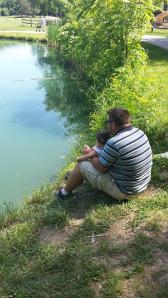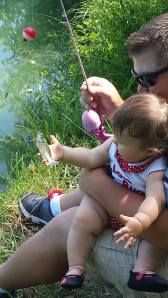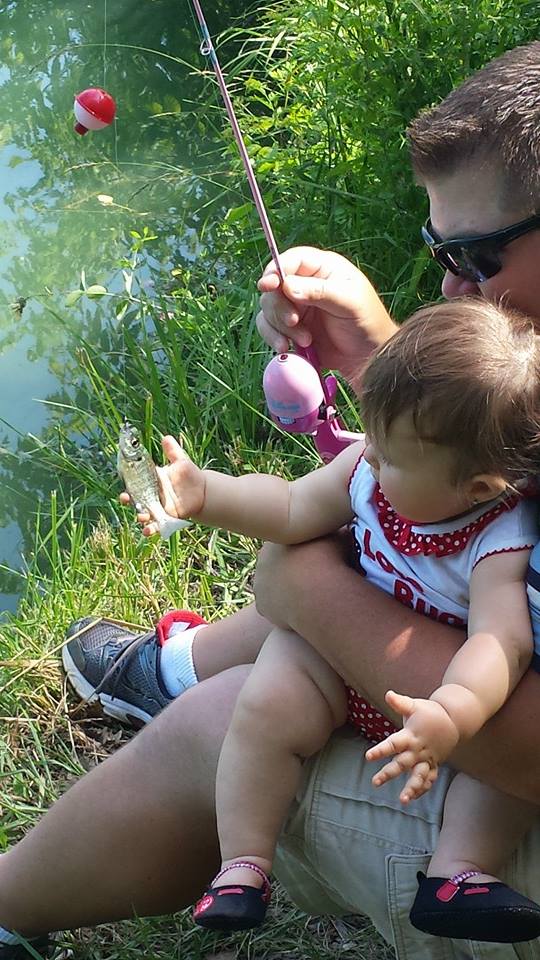by Helena Uber-Wamble
How I became an interpreter:
When I was just a young toddler, my Dad and Mom took me and my older sister fishing. It was his philosophy that if we were old enough to walk, then we were old enough to hold a fishing pole in our hands and catch our first fish. We waddled around the shore in t-shirts and saggy diapers and our very own bamboo fishing pole. Dad would show us the worms and put them on the hook and show us how to fish. Mom and Dad helped each of us. We spent time by the lake and played in the grass. Mom and Dad would tell us about the birds like the Canada Geese otherwise known as “those stupid birds that were in the way,” and the red-winged blackbirds who called out “konk-a-ree.” Dragonflies, damselflies and turtles were always around and we learned quickly that they were part of our outings. They became our “outdoor friends.” We knew we were going to see them at some point when we were at the lake and it became a game to see who could spot the first turtle, insect or bird. There were some areas that were lined with rocks and these became our fossil treasure hunting places as we got older.
When I was 12, my Mom announced that she was going to have a baby. I already had two younger sisters, but we were excited for a new baby. We waited in anticipation for the birth of our sibling and back then there was not an option to find out if you were having a boy or a girl – they were all a surprise! My Mom gave birth to my only brother, who was certainly going to be spoiled by his four older sisters.
Dad took us fishing most weekends and Mom would bring my infant brother along. By the time he was in diapers and walking, we were all ready for him to catch his first fish. The tradition continued, and he was given a bamboo pole at the lake too. Fishing opened up his curiosity about other aspects of nature too. He would bring bugs in the house and ask what they were and Mom would send me to help him identify it.
Now this was way before Google, so I would go to the complete set of Encyclopedia Britannica in the basement. I’d open up the book and look up the information about the insect and read it for my brother. He’d sit quietly next to me and listen. I would look up from the book and translate what the encyclopedia said in easy-to-understand terms. We’d look closely at the insect or object we were learning about, then release it.
This was the beginning of my career and the open window of opportunity for both of us to expand our love of the outdoors. It became a weekly sometimes daily routine to visit the encyclopedia together. My brother had a lot of questions and he loved to explore.
Fast forward to 2013! My career as an interpreter has changed a bit. I interpret the world of birds, their habitats and how they adapt in this ever-changing world. This still includes fish and aquatic critters, as they provide some birds their dinner. I interpret the ebb and flow of the food chain and that every action creates a reaction. Students learn about migration and the challenges that birds face while on their journey and how some birds have made great come backs from their low numbers. I continue to teach younger children, offering programs for pre-K up to adults, because we are all young at heart. Interpretation is always changing, and teaching all ages is challenging, but it keeps me on my toes.
My brother has changed a lot too. He is thirty-three now with his first child. Not too surprising, one of her first words was fish. My Mom watches her a lot and she shows Riley the fish in the aquarium in the dining room when she eats her meals. They also watch the birds at the feeder and naturally Riley will tell Grandma, “bird” whenever the feeder is being visited.
 Riley turned one recently, and my brother bought her a pink child’s fishing pole. (Oh how times have changed.) The next day they all went fishing. Riley has not mastered walking yet, but she sat calmly in my brother’s lap and watched the water. He and her Mom talked to her about the water and the birds and the worm on the hook. Then they cast out her line. Riley held the pole and waited in my brother’s lap. He helped her catch her first fish! When they reeled in the line, Riley got really excited to see a fish on the hook and reached up and grabbed it. She kept saying, “fish, fish”. No fear, no fuss – just reaching out to connect with nature. It was a successful day. A day where another window opened and a child’s curiosity was fueled even more.
Riley turned one recently, and my brother bought her a pink child’s fishing pole. (Oh how times have changed.) The next day they all went fishing. Riley has not mastered walking yet, but she sat calmly in my brother’s lap and watched the water. He and her Mom talked to her about the water and the birds and the worm on the hook. Then they cast out her line. Riley held the pole and waited in my brother’s lap. He helped her catch her first fish! When they reeled in the line, Riley got really excited to see a fish on the hook and reached up and grabbed it. She kept saying, “fish, fish”. No fear, no fuss – just reaching out to connect with nature. It was a successful day. A day where another window opened and a child’s curiosity was fueled even more.
It all started with “a little interpretation”, just pointing out the animals around her are and naming them for her so that she would recognize them anywhere. Another generation’s interest sparked because those around her interpreted for her. Maybe she will become an interpreter too! The tradition of taking young children out and exposing them to nature is being carried on and I am lucky enough to help with that as her Godmother, I can only hope that this tradition continues on for many generations to come because no one is ever too young to explore through curiosity and connect with nature.
